Sunday Editorial on the Upcoming Trial
Posted: 16 Aug 2009
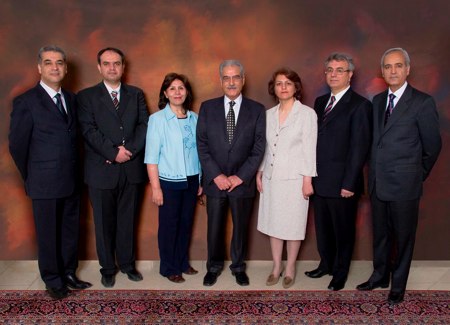 After more than a year of incarceration, the situation of the former leaders (Yaran, meaning "friends") of the Baha'i community of Iran appears to be of profound concern.
After more than a year of incarceration, the situation of the former leaders (Yaran, meaning "friends") of the Baha'i community of Iran appears to be of profound concern.
According to various reports, the seven former leaders of the Baha'i community continue to languish in "temporary" incarceration in a high-security section of the notorious Evin prison, known as section 209. The seven members are Mahvash Sabet (imprisoned since Mar 2008), and the following who have been imprisoned since May 2008: Jamaloddin Khanjani, Saeid Rezaie, Fariba Kamalabadi, Vahid Tizfahm, Behrouz Tavakkoli, and Afif Naeimi.
Pressure on the former Yaran, charged with "espionage on behalf of Israel", "insulting the sacredness of Islam", "propaganda against the regime", and "aiding, teaching and propagating the Baha'i religion in Iran" (tantamount to "mufsed fel-arz" [corrupt on earth] which has historically carried harsh consequences, including the death penalty) includes having had their trial date postponed several times. The trial is now set for next Tuesday, but could once again be delayed by the authorities. The imprisoned former leaders have had no access to their attorneys, led by Nobel Peace prize-winner Shirin Ebadi, who is actually out of country. In fact, their primary lawyer, Mr. Soltani, is himself incarcerated along with many other human rights activists and other civil rights lawyers.
In addition to psychological pressure, such as routinely renewing the "temporary" imprisonment of the Yaran, or keeping them in a high-security facility which naturally imposes considerable restrictions on the seven individuals, it is reported that their meal portions have now been reduced considerably to the point that their health is at serious risk. At the same time, prison authorities refuse to permit the families of prisoners to provide the much-needed provisions which would enable them to sustain the brutal conditions of their imprisonment.
Moreover, with the massive arrests of political and civil activists in recent weeks in Iran and curtailment of telephonic contact between prisoners in Evin and the outside world, the families of these prisoners of conscience have become deeply worried about the condition of their loved ones. The focus on recently imprisoned highly-placed former members of the Iranian regime makes it possible that maltreatment of Baha'i prisoners can take place without incurring significant global outrage.
Based on various reports, Iran Press Watch has been able to prepare the following latest profiles on four of the seven prisoners:
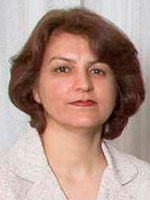 Fariba Kamalabadi has lost a lot of weight and is weak. She is also losing a great deal of hair. It is said that every time she pulls her fingers through her hair, a lot of hair comes loose in her hands.
Fariba Kamalabadi has lost a lot of weight and is weak. She is also losing a great deal of hair. It is said that every time she pulls her fingers through her hair, a lot of hair comes loose in her hands.
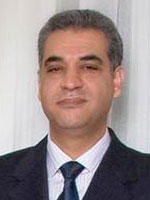 Afif Naeimi suffers from severe backache. Most of the time, he is lying down, unable to move or sit. He receives injections of pain killers whenever the pain becomes unbearable.
Afif Naeimi suffers from severe backache. Most of the time, he is lying down, unable to move or sit. He receives injections of pain killers whenever the pain becomes unbearable.
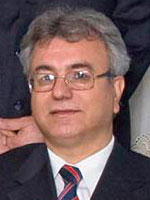 Saeid Rezaie has a hernia and badly needs surgery. Islamic authorities have not allowed him time off from prison for the operation, but the authorities offered to operate on him in prison. Considering the lack of necessary equipment and the high fatality record of those who have had surgery at Evin, he and his family refused the offer. As punishment for not agreeing to be operated on in the deplorable conditions of Evin, he was denied his short weekly visitation with his family for a long time. He also receives pain killer injections whenever the pain from his hernia becomes unbearable.
Saeid Rezaie has a hernia and badly needs surgery. Islamic authorities have not allowed him time off from prison for the operation, but the authorities offered to operate on him in prison. Considering the lack of necessary equipment and the high fatality record of those who have had surgery at Evin, he and his family refused the offer. As punishment for not agreeing to be operated on in the deplorable conditions of Evin, he was denied his short weekly visitation with his family for a long time. He also receives pain killer injections whenever the pain from his hernia becomes unbearable.
 Vahid Tizfahm, the youngest of the former Yaran, is losing his eyesight. The doctor has confirmed that this is due to his severely stressful conditions. Tizfahm's father and uncle were among the many who were previously executed by the Islamic regime. His grieving mother has already lost her husband and her brother and now has to suffer the heartache of having her son in prison, uncertain of his fate. Though she is a very courageous woman, she is understandably saddened by her son's hardships.
Vahid Tizfahm, the youngest of the former Yaran, is losing his eyesight. The doctor has confirmed that this is due to his severely stressful conditions. Tizfahm's father and uncle were among the many who were previously executed by the Islamic regime. His grieving mother has already lost her husband and her brother and now has to suffer the heartache of having her son in prison, uncertain of his fate. Though she is a very courageous woman, she is understandably saddened by her son's hardships.
Lest we forget, there are many other Baha'is imprisoned in Iran (see IranPressWatch1). A summation of our reports indicates that in Shiraz, for example:
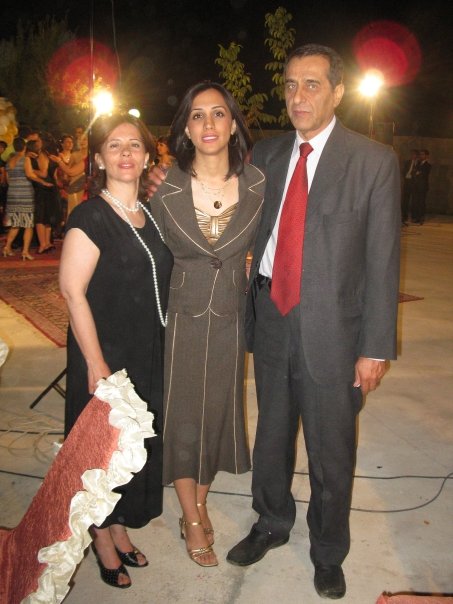 Haleh Rouhi's mother had to have an operation a few weeks ago. The family requested a few days of family leave for Haleh to be with her mother, but their request was denied.
Haleh Rouhi's mother had to have an operation a few weeks ago. The family requested a few days of family leave for Haleh to be with her mother, but their request was denied.
Sasan Taqva has been in solitary confinement for over 20 months. He is suffering from severe pain in his leg. Sometimes he feels numbness, loses balance and falls. His family tried hard to convince the authorities to consent to giving him a ten day leave to receive physiotherapy. During these long months of confinement, the bedding provided by prison officials has consisted of a mere two blankets on the bare concrete floor. Recently, authorities have agreed to give him a plastic chair, so that he does not have to sit on the concrete floor all the time.
Raha Sabet's hobby is embroidery. Even her modest request to have her needlecraft supplies was denied.
One of the parents of the prisoners asked the prosecutor: "Is the ruling against these three detainees a verdict to drive them insane, that you keep them under such inhumane conditions and impose so much pressure on them?"
For further details on the three prisoners in Shiraz, to read the charges against them and their living conditions at the detention centre, plock 100, where they have been held for over 20 months, serving a four year prison term, see: http://www.iranpresswatch.org/post/3940, and http://www.iranpresswatch.org/post/3887
Economic Strangulation of Baha'is
Baha'is are forced into conditions of severe financial hardship. The financial pressure is becoming impossible to tolerate. In many instances, work permits for Baha'i shopkeepers are not renewed. Owners of privately held businesses are asked to fire their Baha'i employees. Islamic officials have asked many Muslim business partners, mainly in Shiraz, Isfahan, and Tehran, to discontinue business relationships with their Baha'i partners. If these Muslim partners disobey, the authorities have threatened that they will be charged with association with the wayward Baha'is and their business operations will be shut down.
An Upbeat Note
Ending on an upbeat note: the three Baha'i prisoners of Yasuj — Ali-Askar Ravanbakhsh, Zulaykha Musavi, and Ruhiyyih Yazdani — have been given a 5 day family leave from prison starting on August 12. This is their first leave in the last two months; they have been imprisoned since Oct 28, 2008.
Posted: 16 Aug 2009
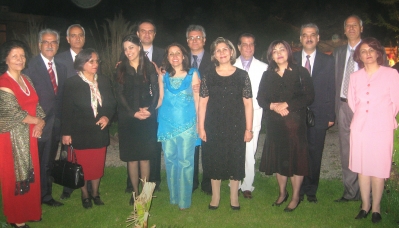 In anticipation of the upcoming trial of the seven former leaders of the Baha'i community of Iran, known as the Yaran, meaning friends, Iran Press Watch is pleased to publish the following short biographical profiles of these brave men and women are provided below. They are presently held in the most dreadful conditions in the notorious Evin prison in Tehran (see IranPressWatch1). Six were arrested in their homes in Tehran on May 14, 2008. A seventh had been arrested earlier, on March 5, 2008, while visiting Mashhad.
In anticipation of the upcoming trial of the seven former leaders of the Baha'i community of Iran, known as the Yaran, meaning friends, Iran Press Watch is pleased to publish the following short biographical profiles of these brave men and women are provided below. They are presently held in the most dreadful conditions in the notorious Evin prison in Tehran (see IranPressWatch1). Six were arrested in their homes in Tehran on May 14, 2008. A seventh had been arrested earlier, on March 5, 2008, while visiting Mashhad.
All have been held without official charges, although reports through the semi-official ISNA news agency state that the cases would be sent to the revolutionary courts with accusations of "espionage for Israel, insulting religious sanctities, and propaganda against the Islamic republic." A fourth charge of "corruption on earth" has also been mentioned.
As the profiles will show, all have served Iranian society and also the Baha'i community extensively. As well, like most Iranian Baha'is, they have all experienced varying degrees of persecution since the Islamic Republic of Iran was established in 1979.
In these profiles, there are a number of references to the Baha'i Institute for Higher Education (BIHE). The BIHE was established by Baha'is in the late 1980s as an alternative institution of higher education after Baha'i youth were banned from public and private universities in Iran in the early 1980s. Accordingly, many of the Friends or their family members received education from the BIHE or its adjunct, the Advanced Baha'i Studies Institute (ABSI), or they have contributed to its work as lecturers or instructors.
In recounting the voluntary service these individuals rendered to the Baha'i community, there are also references to various institutions, such as national or local governing councils, known as Spiritual Assemblies, various committees, or the Auxiliary Board, which comprises a group of individuals appointed to inspire, encourage, and promote learning. Most of these institutions have since been banned or dissolved in Iran because of government persecution.
The Friends are listed in alphabetical order by their last name.
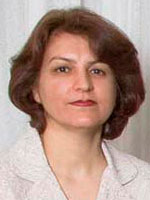 Mrs. Fariba Kamalabadi – arrested 14 May 2008 at her home in Tehran
Mrs. Fariba Kamalabadi – arrested 14 May 2008 at her home in Tehran
Fariba Kamalabadi, 46, a developmental psychologist and mother of three, was denied the chance to study at a public university as a youth because of her Baha'i belief. Because of her volunteer work for the Baha'i community, she was arrested twice in recent years and held for periods of one and two months respectively before her arrest and imprisonment last May.
Mrs. Kamalbadi was born in Tehran on 12 September 1962. An excellent student, she graduated from high school with honors but was nevertheless barred from attending university. Instead, in her mid-30s, she embarked on an eight-year period of informal study and ultimately received an advanced degree in developmental psychology from the Baha'i Institute of Higher Education, an alternative institution established by the Baha'i community of Iran to provide higher education for its young people.
Mrs. Kamalabadi married fellow Baha'i Ruhollah Taefi in 1982. They have three children. Varqa Taefi, about 24, received a doctoral degree in political science and international relations in the United Kingdom and is currently continuing his research in China. Alhan Taefi, 23, has studied psychology at ABSI. Taraneh Taefi, 14, is a junior high school student in Tehran.
Mrs. Kamalabadi's experience with persecution extends beyond her immediate situation. Her father was fired from his job as physician in the government health service in the 1980s because he was a Baha'i, and he was later imprisoned and tortured.
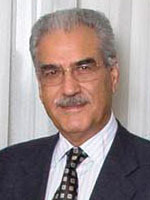 Mr. Jamaloddin Khanjani – arrested 14 May 2008 at his home in Tehran.
Mr. Jamaloddin Khanjani – arrested 14 May 2008 at his home in Tehran.
Jamaloddin Khanjani, 75, is a once-successful factory owner who lost his business after the 1979 Islamic revolution because of his belief in the Baha'i Faith – and who then spent most of the 1980s on the run under the threat of death from Iranian authorities.
Born 27 July 1933 in the city of Sangsar, Mr. Khanjani grew up on a dairy farm in Semnan province and never obtained more than a high school education. Yet his dynamic personality soon led to a successful career in industrial production – and as a Baha'i leader.
In his professional career, he has worked as an employee of the Pepsi Cola Company in Iran, where he was a purchasing supervisor. He later left Pepsi Cola and started a charcoal production business. Later he established a brick-making factory, which was the first automated such factory in Iran, ultimately employing several hundred people.
In the early 1980s, he was forced to shut down that factory and abandon it, putting most of his employees out of work, because of the persecution he faced as a Baha'i. The factory was later confiscated by the government.
In his career of voluntary service to his religious community, Mr. Khanjani was at various points a member of the local spiritual assembly of Isfahan, a regional level Auxiliary Board member, and, in the early 1980s, a member of the so-called "third" National Spiritual Assembly of the Baha'is of Iran – a group that in 1984 saw four of its nine members executed by the government.
After that, Mr. Khanjani was able to establish a mechanized farm on properties owned by his family. Nevertheless, authorities placed many restrictions on him, making it difficult to do business. These restrictions extended to his children and relatives, and included refusing loans, closing their places of business, limiting their business dealings, and banning travel outside the country.
Mr. Khanjani married Ms. Ashraf Sobhani in the mid-1950s. They have four children. Farida Khanjani, 51, is a chiropractor working in China. Maria Khanjani, about 49, an artist who is married with two children and residing in Tehran. Mr. Alaeddin Khanjani, about 48, an optometrist residing in Tehran, who is married with two children. And Mrs. Emilia Khanjani, about 45, who is married with two children and resides in Tehran.
Mr. Khanjani was arrested and imprisoned at least three times before his current incarceration. After years on the run, he was arrested and imprisoned for two months in the late 1980s. During this period of detention, he was intensely questioned. During those interrogations, however, he was able to make considerable headway in convincing authorizes of the non-threatening nature of the Baha'i Faith and he, along with many others, were subsequently released.
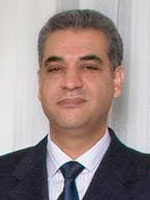 Mr. Afif Naemi – arrested 14 May 2008 at his home in Tehran
Mr. Afif Naemi – arrested 14 May 2008 at his home in Tehran
Afif Naemi, 47, is an industrialist who was unable to pursue his dream of becoming a doctor because as a Baha'i he was denied access to a university education. Instead, he diverted his attention to business, one of the few avenues of work open to Baha'is, taking over his father-in-law's blanket and textile factory.
He was born on 6 September 1961 in Yazd. His father died when he was three and he was raised in part by his uncles. While still in elementary school, he was sent to live with relatives in Jordan and, although he started with no knowledge of Arabic, he soon rose to the top of his class.
He has long been active in volunteer Baha'i service. He has taught Baha'i children's classes, conducted classes for adults, taught at the BIHE, and been a member of the Auxiliary Board, an appointed position which serves principally to inspire, encourage, and promote learning among Baha'is.
He married Ms. Shohreh Khallakhi in the early 1980s. They have two sons, Fareed Naimi, 27, who is married and a graduate of the ABSI, and Sina Naimi, 22, who has studied music.
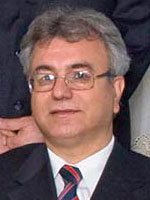 Mr. Saeid Rezaie – arrested 14 May 2008 at his home in Tehran.
Mr. Saeid Rezaie – arrested 14 May 2008 at his home in Tehran.
Saeid Rezaie, 51, is an agricultural engineer who has run a successful farming equipment business in Fars Province for more than 20 years. He is also known for his extensive scholarship on Baha'i topics, and is the author of several books.
Born in Abadan on 27 September 1957, Mr. Rezaie spent his childhood in Shiraz, where he completed high school with distinction. He then obtained a degree in agricultural engineering from Pahlavi University in Shiraz, attending with the help of a scholarship funded from outside the country.
In 1981, he married Ms. Shaheen Rowhanian. They have three children, two daughters and a son. Martha, 24, is studying library science. Ma'man, 21, is studying architecture. Payvand, 12, is in his second year of middle school.
Mr. Rezaie has actively served the Baha'i community since he was a young man. He taught Baha'i children's classes for many years, and served the Baha'i Education and Baha'i Life Institutes. He was also a member of the National Education Institute.
He is a scholar and an author, and he has served as an academic adviser to Baha'i students.
During the early 1980s, when persecution of Baha'is was particularly intense and widespread, Mr. Rezaie moved to northern Iran and worked as a farming manager for a time. Later he moved to Kerman and worked as a carpenter and at other odd jobs in part because of the difficulties Baha'is faced in finding formal employment or operating businesses.
In 1985, he opened an agricultural equipment company with a Baha'i friend in Fars Province. That company prospered and won wide respect among farmers in the region.
He has experienced various forms of persecution for his Baha'i belief, including an arrest and detention in 2006 that led to 40 days in solitary confinement.
His two daughters were among 54 Baha'i youth who were arrested in Shiraz in May 2006 while engaged in a humanitarian project aimed at helping underprivileged young people. They were later released but three of their colleagues were sentenced to four years in prison on false charges and are currently incarcerated in Shiraz.
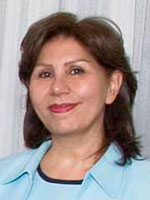 Mrs. Mahvash Sabet – arrested in Mashhad on 5 March 2008.
Mrs. Mahvash Sabet – arrested in Mashhad on 5 March 2008.
Mahvash Sabet, 55, is a teacher and school principal who was dismissed from public education for being a Baha'i. For the last 15 years, she has been director of the Baha'i Institute for Higher Education, which provides alternative higher education for Baha'i youth. She also served as secretary to the Friends.
Born Mahvash Shahriyari on 4 February 1953 in Ardestan, Mrs. Sabet moved to Tehran when she was in the fifth grade. In university, she studied psychology, obtaining a bachelor's degree.
She began her professional career as a teacher and also worked as a principal at several schools. In her professional role, she also collaborated with the National Literacy Committee of Iran. After the Islamic revolution, however, like thousands of other Iranian Baha'i educators, she was fired from her job and blocked from working in public education.
It was after this that she became director of the BIHE, where she also has taught psychology and management.
She married Siyvash Sabet on 21 May 1973. They have a son, Masrur Sabet, 33, and a daughter, Nega Sabet, 24, both born in Hamadan.
While all of the other Friends were arrested at their homes in Tehran on 14 May 2008, Mrs. Sabet was arrested in Mashhad on 5 March 2008. Although she resides in Tehran, she had been summoned to Mashhad by the Ministry of Intelligence, ostensibly on the grounds that she was required to answer questions related to the burial of an individual in the Baha'i cemetery in that city.
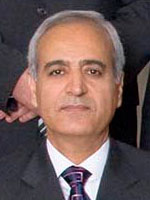 Mr. Behrouz Tavakkoli – arrested 14 May 2008 at his home in Tehran
Mr. Behrouz Tavakkoli – arrested 14 May 2008 at his home in Tehran
Behrouz Tavakkol, 57, is a former social worker who lost his government job in the early 1980s because of his Baha'i belief. Prior to his current imprisonment, he has also experienced intermittent detainment and harassment and, three years ago, he was jailed for four months without charge, spending most of the time in solitary confinement.
Born 1 June 1951 in Mashhad, Mr.Tavakkoli studied psychology in university and then completed two years of service in the army, where he was a lieutenant. He later took additional training and then specialized in the care of the physically and mentally handicapped, working in a government position until his firing in 1981 or 1982.
Mr. Tavakkoli married Ms. Tahereh Fakhri Tuski at the age of 23. They have two sons, Naeim and Nabil. Naeim, 31, currently lives in Canada with his wife where he works as a civil engineer. Nabil, 24, is currently studying architecture at the Baha'i Institute for Higher Education
Mr. Tavakkoli was elected to the local Baha'i governing council in Mashhad in the late 1960s or early 1970s while a student at the university there, and he later served on another local Baha'i council in Sari before such institutions were banned in the early 1980s. He also served on various youth committees, and, later, during the early 1980s he was appointed to the Auxiliary Board. He was appointed to the Friends group in the late 1980s.
To support himself and his family after he was fired from his government position, Mr. Tavakkoli established a small millwork carpentry shop in the city of Gonbad. There he also established a series of classes in Baha'i studies for adults and young people.
He has been periodically detained by the authorities. Among the worst of these incidents was three years ago when he was held incommunicado for 10 days by intelligence agents, along with fellow Friends' member Fariba Kamalabadi. He was then held for four months and during that confinement developed serious kidney and orthotic problems.
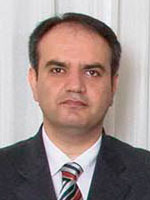 Mr. Vahid Tizfahm – arrested 14 May 2008 at his home in Tehran
Mr. Vahid Tizfahm – arrested 14 May 2008 at his home in Tehran
Vahid Tizfahm, 37, is an optometrist and owner of an optical shop in Tabriz, where he lived until early 2008, when he moved to Tehran.
He was born 16 May 1973 in the city of Urumiyyih. He spent his childhood and youth there and, after receiving his high school diploma in mathematics, he went to Tabriz at the age of 18 to study to become an optician. He later also studied sociology at the Advanced Baha'i Studies Institute (ABSI).
At the age of 23, Mr. Tizfahm married Furuzandeh Nikumanesh. They have a son, Samim, who is now nine years old and in the fourth grade.
Since his youth, Mr. Tizfahm has served the Baha'i community in a variety of capacities. At one time he was a member of the Baha'i National Youth Committee. Later, he was appointed to the Auxiliary Board, an advisory group that serves to uplift and inspire Baha'i communities at the regional level. He has also taught local Baha'i children's classes. He was appointed to the Friends in 2006.
[Republished based on: http://www.iranpresswatch.org/post/1116]







No comments:
Post a Comment